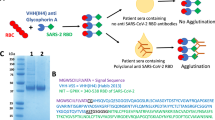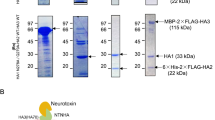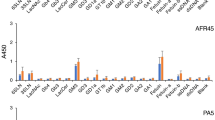Abstract
ENHANCED lectin-mediated agglutination following alteration of cells by transformation or protease treatment is well documented1,2. However, the mechanism underlying these observations remains obscure. Recent evidence suggests that enhanced agglutinability of erythrocytes treated with pro-teolytic enzymes, neuraminidase or both, may be the result of reduced surface charge and/or loss of sterically hindering peptides and glycopeptides3. We wondered whether the alteration in a part of the cell population would be sufficient to enhance the agglutinability of the entire cell population with concanavalin A (con A) and soybean agglutinin (SBA). We report here that the extent, and to a slightly lesser degree, the rate of lectin-mediated agglutination of untrypsinised erythrocytes mixed with equal volumes of trypsinised erythrocytes closely parallel the values obtained for trypsinised cells alone. We conclude that the proteolytic alteration of only some of the erythrocytes is sufficient to promote enhanced lectin-mediated agglutination of all cells when mixed with equal numbers of native cells. A similar phenomenon holds true for native cells when mixed with neuraminidase-treated cells.
This is a preview of subscription content, access via your institution
Access options
Subscribe to this journal
Receive 51 print issues and online access
$199.00 per year
only $3.90 per issue
Buy this article
- Purchase on Springer Link
- Instant access to full article PDF
Prices may be subject to local taxes which are calculated during checkout
Similar content being viewed by others
References
Rapin, A. M. C. & Burger, M. M. Adv. Cancer Res. 20, 1–99 (1974)
Nicolson, G. L. Int. Rev. Cytol. 39, 89 (1974).
Schnebli, H. P., Roeder, C. & Tarcsay, L. Expl Cell Res. 98, 273–276 (1976).
Skelton, G. S., Orszagh, J., Gregoire, J., Parent, G. & Lukusa, K. Analyst 101, 992–995 (1976).
Erlanger, B. F., Kakowsky, N. & Cohen, W. Archs Biochem. Biophys. 95, 271–278 (1961).
Gordon, J. A., Blumberg, S., Lis, H. & Sharon, N. FEBS Lett. 24, 193 (1972).
Lotan, R., Skutelsky, E., Damon, D. & Sharon, N. J. biol. Chem. 250, 8518–8523 (1975)
Marquardt, M. D. & Gordon, J. A. Expl Cell Res. 91, 310–316 (1975).
Skutelsky, E., Lotan, R., Sharon, N. & Danon, D. Biochim. biophys. Acta 467, 165–174 (1977).
Reid, H. L., Barnes, A. J., Lock, P. J., Dormandy, J. A. & Dormandy, T. L. J. clin..Path. 29, 855–858 (1976).
Weiss, L. J. Cell Biol. 30, 39–43 (1966).
Weiss, L. J. natn. Cancer Inst. 50, 3–19 (1973).
Reisner, Y., Liss, H. & Sharon, N. Expl Cell Res. 97, 445–448 (1976).
Author information
Authors and Affiliations
Rights and permissions
About this article
Cite this article
GORDON, J., KUETTNER, C. Enhanced agglutination of all the erythrocytes when only half are trypsinised. Nature 272, 636–638 (1978). https://doi.org/10.1038/272636a0
Received:
Accepted:
Issue Date:
DOI: https://doi.org/10.1038/272636a0
This article is cited by
-
A comparison of different imaging techniques in low energy ?-ray astronomy
Experimental Astronomy (1990)
-
Einstein observations of the galactic centre
Space Science Reviews (1981)
Comments
By submitting a comment you agree to abide by our Terms and Community Guidelines. If you find something abusive or that does not comply with our terms or guidelines please flag it as inappropriate.



